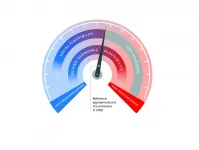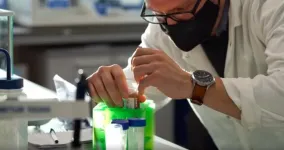Climate protection: Deep decarbonization by 2050 currently not plausible
2021-06-10
(Press-News.org) Today the Hamburg-based Cluster of Excellence "Climate, Climatic Change, and Society" (CLICCS) publishes a new, essential study on climate futures. The study represents the first systematic attempt to investigate whether a climate future with net-zero carbon emissions is not only possible but also plausible. The authors examine plausibility from a technical-economic perspective, but also with regard to the societal changes necessary for such a future. They conclude that deep decarbonization by 2050 is currently not plausible - the current efforts to bring about societal transformation need to be far more ambitious.
The European Union is now increasing the ambition of its climate goals, and the German Federal Constitutional Court has recently committed Germany to implementing more ambitious climate action. So, are we already on the path to a climate-neutral future? "Which climate futures are plausible is not only a physical question, it is at present especially a social one," says CLICCS Speaker Prof. Detlef Stammer from Universität Hamburg. "In the Hamburg Climate Futures Outlook we investigate the transformative power of social processes and have developed a completely new method for doing so. We'll then combine the outcomes with findings from the natu-ral sciences, allowing us to narrow down, step by step, what's plausible."
The key factors being explored, also referred to as social drivers, include: United Nations' climate policy, national climate legislation, protests and social movements, divesting from fossil fuel industries, and media coverage. Crucially, none of the ten social drivers assessed in the Outlook appear to have enough momentum to reach deep decarbonization by 2050. Yet reaching deep decarbonization by mid-century is vital if the climate targets laid out in the Paris Agreement are to be achieved.
However, six of the drivers could foster a gradual decarbonization: "The majority of the factors we evaluated certainly support the net-zero goal. For example, the factor 'climate policy' has been strengthened by the USA's reentry into the Paris Agreement," explains Prof. Anita Engels, a social scientist at Universität Hamburg and CLICCS Co-Chair. "At the same time, the extent to which climate protests can continue to put pressure on governments after COVID-19 will be an important aspect." Another crucial driver is the divestment from fossil fuels. However, companies often operate under long investment cycles, which means the effects will only become ap-parent down the road.
The authors concluded that, at the moment, neither high-emissions nor low-emissions scenarios are plausible: "Studies show that very high CO2 emissions can produce tremendous economic costs. What's more: global coal reserves are finite, and clean energy is becoming more afforda-ble. As such, governments and companies alike will be forced to change course," says CLICCS Co-Chair Prof. Jochem Marotzke from the Max Planck Institute for Meteorology. However, we're still lacking the technologies needed for the rapid and large-scale removal of carbon dioxide from the atmosphere - an essential prerequisite for cutting emissions to net zero.
The authors further translated these findings about plausible emissions into an assessment of long-term warming, by incorporating the latest research on how CO2 emissions affect the climate: "Our results imply that global surface warming of less than 1.7 degrees Celsius by the year 2100 is not plausible, but nor is a rise of more than 4.9 degrees."
The Hamburg Climate Futures Outlook fills an important gap. Other studies-like the IPCC Special Report on Global Warming of 1.5°C and the United Nations Emissions Gap Report-also assess which pathways might achieve the goals laid out in the Paris Agreement, but they focus more on the technical and practical requirements. "The Hamburg Climate Futures Outlook analyzes which social drivers can enable and motivate the change. We're using this new analytical framework to systematically assess the available data with regard to the necessary decarboniza-tion," said Prof. Engels.
The study's analytical approach is unique: "In the Hamburg Climate Fu-tures Outlook, we're not looking into what would be necessary, feasible or desirable. We're ana-lyzing which climate futures are plausible - and which ones aren't," says Prof. Marotzke, who was also one of the key contributors to the upcoming IPCC report. "The social challenge is far greater than many people can imagine," concludes Prof. Stammer. "As such, our findings repre-sent a wake-up call for the political community and society at large."
INFORMATION:
By June 10 the official website will be online:
http://www.cliccs.uni-hamburg.de/results/hamburg-climate-futures-outlook.html
About the Hamburg Climate Futures Outlook:
More than 40 researchers from the Cluster of Excellence CLICCS are contributing authors of the Hamburg Climate Futures Outlook. They hail from such diverse disciplines as the natural sciences, social sciences, economics and law. In addition, there are ca. 20 national and international review-ers. With the development of the Social Plausibility Assessment Framework, the Cluster has intro-duced a new scientific method for both assessing the status quo of social drivers and projecting their future trajectory.
From 2021 onwards, the Hamburg Climate Futures Outlook will be released annually. It analyzes both physical and social dynamics alike, and evaluates which climate futures are not only possible but also plausible.
The Cluster of Excellence Climate, Climatic Change, and Society (CLICCS) at Universität Hamburg is funded by the German Research Foundation (DFG). Based at the Center for Earth System Research and Sustainability (CEN) at Universität Hamburg, it works in close cooperation with eleven partner institutes, including the Max Planck Institute for Meteorology in Hamburg, the Helmholtz Centre Hereon and the German Climate Computing Center.
DOI: 10.25592/uhhfdm.9104
Contact
Prof. Dr. Detlef Stammer
Universität Hamburg
Center for Earth System Research and Sustainability (CEN)
Cluster of Excellence Climate, Climatic Change, and Society (CLICCS)
Tel: +49 (0) 40 42838 5052
Email: detlef.stammer@uni-hamburg.de
Prof. Dr. Anita Engels
Universität Hamburg
Center for Earth System Research and Sustainability (CEN)
Cluster of Excellence Climate, Climatic Change, and Society (CLICCS)
Tel: +49 (0) 40 42838
Email: anita.engels@uni-hamburg.de
Prof. Dr. Jochem Marotzke
Max Planck Institute for Meteorology
Cluster of Excellence Climate, Climatic Change, and Society (CLICCS)
Tel: +49 (0) 40 41173 440
Email: jochem.marotzke@mpimet.mpg.de
Ute Kreis
Outreach / Public Relations (CEN/CLICCS)
Universität Hamburg
Center for Earth System Research and Sustainability (CEN)
Tel: +49 (0) 40 42838 4523
Email: ute.kreis@uni-hamburg.de
[Attachments] See images for this press release:

ELSE PRESS RELEASES FROM THIS DATE:
2021-06-10
Researchers have created a plant-based, sustainable, scalable material that could replace single-use plastics in many consumer products.
The researchers, from the University of Cambridge, created a polymer film by mimicking the properties of spider silk, one of the strongest materials in nature. The new material is as strong as many common plastics in use today and could replace plastic in many common household products.
The material was created using a new approach for assembling plant proteins into materials which mimic silk on a molecular level. The energy-efficient method, which uses sustainable ingredients, results in a plastic-like free-standing film, which can be made at industrial ...
2021-06-10
Researchers from North Carolina State University have turned a longstanding challenge in DNA data storage into a tool, using it to offer users previews of stored data files - such as thumbnail versions of image files.
DNA data storage is an attractive technology because it has the potential to store a tremendous amount of data in a small package, it can store that data for a long time, and it does so in an energy-efficient way. However, until now, it wasn't possible to preview the data in a file stored as DNA - if you wanted to know what a file was, you had to "open" the entire file.
"The advantage to our technique is that it is more efficient ...
2021-06-10
DALLAS, June 10, 2021 -- The distance a stroke patient must travel to receive care at a certified stroke center differs by race, age, income and insurance status, with the largest disparities found among rural residents and American Indians, according to a combined analysis of U.S. census data and road maps published today in Stroke, a journal of the American Stroke Association, a division of the American Heart Association.
Treatment for ischemic stroke, a blockage in an artery that supplies blood to the brain, restores blood flow to the brain. Rapid treatment is essential to reduce disability. Blood flow may be reestablished by administering intravenous clot-busting medication within 4.5 hours after the onset of stroke ...
2021-06-10
Polymetallic nodules and crusts cover many thousands of square kilometres of the world's deep-sea floor. They contain valuable metals and rare earth elements and are therefore of great economic interest. To date, there is no market-ready technology for deep-seabed mining. But it is already clear that interventions in the seabed have a massive and lasting impact on the areas affected. This is also confirmed by a study now published by Tanja Stratmann from the Max Planck Institute for Marine Microbiology in Bremen, Germany, and researchers from the Senckenberg am Meer Institute in Wilhelmshaven, Germany, and the Dutch research institute NIOZ.
In their study, Stratmann and her colleagues used data from ...
2021-06-10
When nature vanishes, people of color and low-income Americans disproportionally lose critical environmental and health benefits--including air quality, crop productivity and natural disease control--a new study in Nature Communications finds.
The University of Vermont research is the first national study to explore the unequal impacts on American society--by race, income and other demographics--of projected declines in nature, and its many benefits, across the United States.
Focusing on three vital ecosystem services--air quality, crop pollination, and control of insect-borne disease (West Nile virus), researchers project that these benefits of nature will decrease for non-white people by an average of 224%, ...
2021-06-10
Can you imagine one day using a telescope as thin as a sheet of paper, or a much smaller and lighter high-performance camera? Or no longer having that camera bump behind your smartphone?
In a paper published in Nature Communications, researchers from the University of Ottawa have proposed a new optical element that could turn these ideas into reality by dramatically miniaturizing optical devices, potentially impacting many of the applications in our lives.
To learn more about this project, we talked to lead author Dr. Orad Reshef, a senior postdoctoral fellow in the Robert Boyd Group, and research lead Dr. Jeff Lundeen, who is the Canada Research Chair in Quantum Photonics, Associate Professor in the ...
2021-06-10
A class of drug called monoamine oxidase inhibitors is commonly prescribed to treat depression; the medications work by boosting levels of serotonin, the brain's "happiness hormone."
A new study by UCLA researchers suggests that those drugs, commonly known as MAOIs, might have another health benefit: helping the immune system attack cancer. Their findings are reported in two papers, which are published in the journals Science Immunology and Nature Communications.
"MAOIs had not been linked to the immune system's response to cancer before," said Lili Yang, senior author of the study and a member of the Eli and Edythe Broad Center of Regenerative Medicine and Stem Cell Research at UCLA. "What's especially exciting is that this is a very well-studied and ...
2021-06-10
The largest study of its kind has unveiled new insights into how genes are regulated in dementia, including discovering 84 new genes linked to the disease.
Led by the University of Exeter, the international collaboration combined and analysed data from more than 1,400 people across six different studies, in a meta-analysis published in Nature Communications. These studies had used brain samples from people who had died with Alzheimer's disease. The project, funded by Alzheimer's Society and supported by the Medical Research Council and the National Institutes for ...
2021-06-10
UNIVERSITY OF TORONTO & CARLETON UNIVERSITY
New research published online in the journal Substance Use & Misuse is good news for those struggling with alcohol dependence: the possibility of ending this dependency gets easier with age. Moreover, more than half of individuals who have been dependent on alcohol are free of any addictions or mental illness, and nearly 40% are in excellent mental health.
Using data drawn from Statistics Canada's Canadian Community Health Survey-Mental Health, researchers examined a nationally representative sample of 820 adult Canadians with a history of alcohol dependence to 19,945 who had never been addicted to alcohol.
They found that in the past year, 71% of ...
2021-06-10
PISCATAWAY, NJ - Underage youth consumed $17.5 billion worth, or 8.6 percent, of the alcoholic drinks sold in 2016. Products from three alcohol companies--AB Inbev, MillerCoors and Diageo--accounted for nearly half of youth consumption, according to a new study published in the Journal of Studies on Alcohol and Drugs.
Data collected in a landmark study of youth alcohol consumption by brand enabled the authors to calculate the first estimate in nearly 20 years of the monetary value of youth alcohol consumption. And for the first time, they were able to attribute those revenues to specific companies.
"The alcohol industry has said they don't want minors to drink, ...
LAST 30 PRESS RELEASES:
[Press-News.org] Climate protection: Deep decarbonization by 2050 currently not plausible




